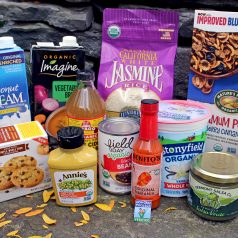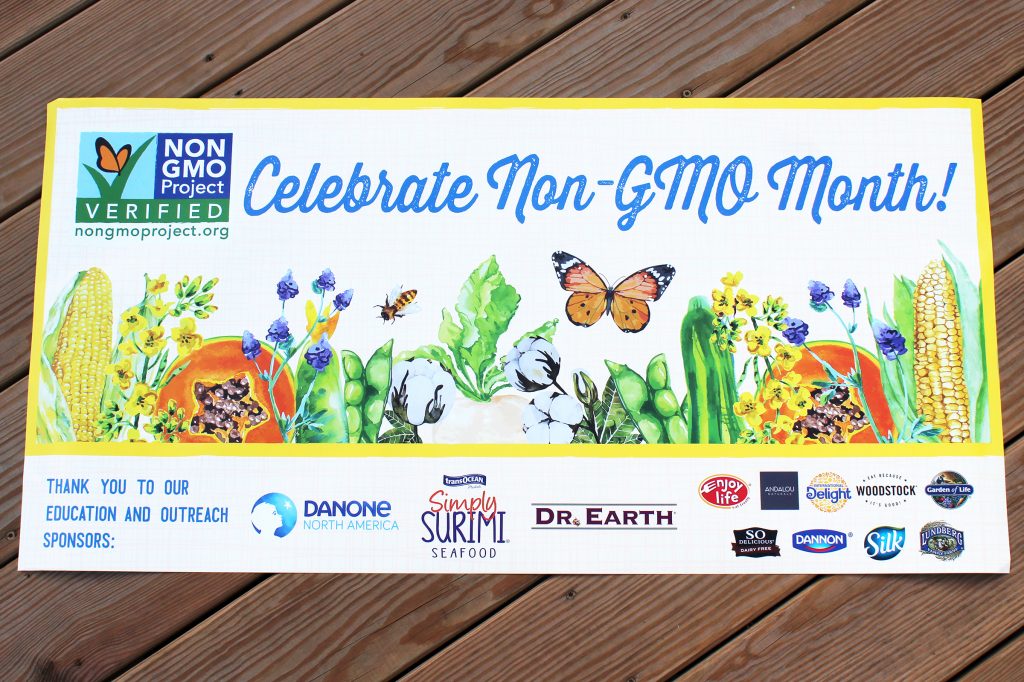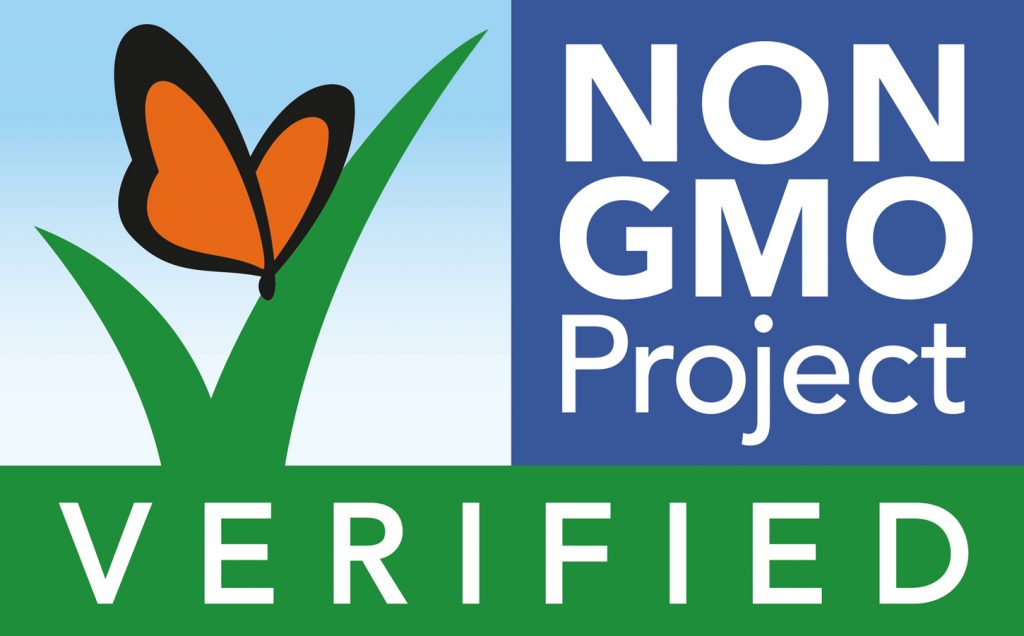
Celebrating Non-GMO Month
October is Non-GMO Month! We’re grateful to be able to offer an ever-expanding list of hundreds of products that are Non-GMO Verified by the certifying body at the Non-GMO Project. You’ll find many of these products featured in our weekly sale from October 11th – 17th as part of our celebration of Non-GMO Month. The Non-GMO Project Product Verification Program is North America’s only third-party verification for non-GMO food and products. Third-party verification provides the greatest assurance when it comes to product labeling and certifications because it ensures products have been comprehensively evaluated by an independent party for compliance with a standard developed by industry experts and stakeholders. When you’re shopping for non-GMO products at the Co-op, look for the Non-GMO Verified Logo with the butterfly. You can also feel confident that Certified Organic products are GMO-free.
As we celebrate all things Non-GMO this month, we wanted to take a moment to share a great blog post written by Alli Willis, Communications Director at the Non-GMO Project, about the threat to seed sovereignty caused by the patenting of genetically modified seed:

At the Non-GMO Project, we believe that by encouraging a non-GMO seed supply, we are supporting the restoration of traditional seed breeding and the right of farmers to save and plant their own seeds and grow varieties of their choice. It’s one of our most important principles. But why do we need to restore these traditional farming practices in the first place? One important reason is that some of agriculture’s biggest corporations use patents to control how farmers grow crops.
What are Patents?
Patents are a form of intellectual property rights. In most countries, an inventor who creates a novel product, material, or process may apply for a patent by thoroughly describing their invention, usually with the help of a patent lawyer. Once a patent has been awarded, other people cannot make or sell the same invention until the patent expires.
A patent is different from a trademark—those protect words, phrases, and symbols that indicate the source of goods and distinguish them from others. It is also different from a copyright—those protect certain forms of creative works and expressed ideas.
What Do Patents Have to Do with GMOs?
It is legally possible to patent plants in many countries, including the United States and Canada. Initially, this protected the farmers who create new varieties of crops using traditional cross-breeding methods. If you’ve ever had a Cuties clementine orange or a Cotton Candy grape, you’ve eaten patented non-GMO fruit. Even Honeycrisp apples were patented until the patent expired about a decade ago.
Since the advent of GMOs—plants, animals, microorganisms or other organisms whose genetic makeup has been modified in a laboratory using genetic engineering—this same law has permitted chemical companies to patent their GMOs. While chemical companies tell consumers and regulators that their GMOs are the same as conventional crops, they simultaneously tell the patent office that their genetically engineered crops are unique enough to deserve a patent.
It is important to understand that chemical agriculture companies such as Syngenta and Dow do not simply hold plant patents on the finished crop or its seed, but in many cases they hold utility patents as well. They are able to patent specific genes and the methods for altering those genes. They also hold patents on, for example, the Roundup that goes hand-in-hand with Roundup-ready crops. These corporations, therefore, often possess ownership over the entire process of growing food.
The introduction of GMOs expedited the transformation of food from shared resource to patented property. A couple of years ago, a scant seven corporations controlled the majority of the global seed market. Today, following the Dow-Dupont and Bayer-Monsanto mergers, just three companies control about 60 percent of the world’s seed supply.
This imbalance of power is even more pronounced in the ownership of high-risk commodity crops. For example, more than 80 percent of the global corn supply is owned by the very biggest chemical companies. This gives those corporations a disproportionate and even dangerous amount of power over how our food is grown, studied, and regulated.
But What about Patents on Non-GMO Seeds?
Non-GMO seeds can be patented too. The key differences are the number of patents and the degree to which those patents impact large-scale agriculture. Some of the most commonly-patented non-GMO plants are actually flowers, not food. Meanwhile, some GMO-producing corporations hold more than thousands of patents (search here to explore these patents), and they hold them on major commodity crops such as soy and corn. Do we really want to live in a world where we depend on just a couple companies for the whole world’s seed supply?
At the Non-GMO Project, we do not. We do, however, want to live in a world where individual farmers have the power to collect, crossbreed, and save their own seeds.
What Do Patented GMOs Mean For Farmers?
When farmers choose to plant GMO seeds, they must first sign a technology use agreement or a licensing agreement. These contracts dictate what farmers can and cannot do with the seeds they buy. A typical contract:
- Forbids saving, cleaning, or sharing seeds
- Forbids using seeds for research
- Requires farmers to allow the company to access their land, documents, and sometimes even Internet Service Provider records.
If you’d like to read a real biotech technology agreement, check out these examples:
These contracts also mean that farmers who violate their agreement—even unintentionally—may face litigation. Monsanto was particularly notorious for suing farmers, even when those farmers did not have an agreement with the company. They’ve even sued individual farm workers just for doing their jobs. These lawsuits are financially disastrous for small farms. Meanwhile, (pre-Bayer) Monsanto has been awarded more than $15 million in judgements against farmers.
What Does This Mean For Research?
Unfortunately, certain chemical companies have also been known to use their patent ownership to restrict research. Their contracts almost always explicitly forbid farmers to use or allow others to use seeds for research.
When a researcher or university wants to conduct their own study, they need to get permission from the patent holder. This allows the same corporations who make the GMOs to control who is allowed to study the GMOs. Sometimes they forbid research, and sometimes they restrict access to seeds and other materials. Even when research is possible, corporations that own the seeds retain the right to control publishing. When chemical companies dictate who can study their products, truly independent research is not possible.
What Can Consumers Do to Help?
Chemical companies have turned patents and litigation into weapons against farmers big and small. The good news is that as consumers, we have the power to change the way our food is grown and made. By voting with our dollars, we can choose not to support practices that privatize our food supply, hurt small farmers, and restrict the free flow of information. The non-GMO movement is about more than the right to know, it’s also about doing what’s right. If you care about protecting our seed supply against predatory practices and corporate ownership, Look for the Butterfly when you shop.

